Main CPGW Record
Surname: SANDERSON
Forename(s): Walter
Place of Birth: Dowbiggin, Yorkshire
Service No: 267237
Rank: L/Corporal
Regiment / Corps / Service: Duke of Wellington’s (West Riding Regiment)
Battalion / Unit: 2/7th Battalion
Division: 62nd (2/West Riding) Division
Age: ---
Date of Death: 1918-03-26
Awards: ---
CWGC Grave / Memorial Reference: 7.
CWGC Cemetery: POMMIER COMMUNAL CEMETERY
CWGC Memorial: ---
Non-CWGC Burial: ---
Local War Memorial: CAUTLEY, YORKSHIRE
Local War Memorial: SEDBERGH, YORKSHIRE
Additional Information:
Walter Sanderson son of Thomas Richard and Rose Sanderson, née Haygarth. Both of Walter's parents were born at Garsdale, Yorkshire.
1901 Sedbergh, Yorkshire Census: Kilnbeck, Dowbiggin - Walter Sanderson, aged 7 years, born Sedbergh, Yorkshire, son of Thomas and Rose Sanderson.
1911 Sedbergh, Yorkshire Census: Kilnbeck, Dowbiggin - Walter Sanderson, aged 16 years, born Dowbiggin, Yorkshire, son of Thomas and Rose Sanderson.
Walter is listed in the Nominal Roll of the 2/6th Battalion Duke of Wellington's (West Riding Regiment): 'D' Coy - Pte W. Sanderson.
British Army WW1 Medal Rolls Index Cards: Pte Walter Sanderson, 267237, W. Rid. R.
British Army WW1 Medal and Award Rolls: Pte Walter Sanderson, 267237, 2/6. W. Rid. R.; 2/7. W. Rid. R. D. of W. 26.3.18.
Army Registers of Soldiers' Effects: L/Cpl Walter Sanderson, 267237, 2/7 Bn W. Riding. Date and Place of Death: 26.3.18. France wounds. To whom Authorised/Amount Authorised: Father and sole legatee - Thomas R. £27 3s. 5d.
Walter went to France in February 1917 with 'D' Coy 2/6th Battalion Duke of Wellington's (West Riding Regiment). When this battalion was disbanded on the 31 January 1918, Walter was transferred to the 2/7th Battalion. He was mortally wounded near Bucquoy, France, during one of the German Offensives of 1918.
A short biography of Walter is included in: ‘Sedbergh and District 1914-1918 – But who shall return the children?’ Compiled by Sedbergh and District History Society. Edited by Diane Elphick (2016).
Photograph courtesy of John and Caroline Sanderson, Endmoor, Cumbria and Rose Sanderson, Sedbergh, Cumbria.
Data Source: Local War Memorial
---
Entry in West Yorkshire Pioneer Illustrated War Record: ---
---
Click the thumbnail below to view a larger image.
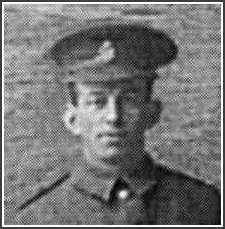
L/Corporal Walter SANDERSON
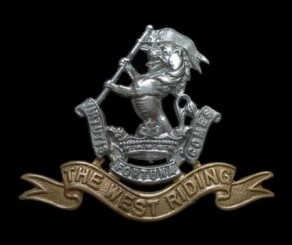
Regiment / Corps / Service Badge: Duke of Wellington’s (West Riding Regiment)
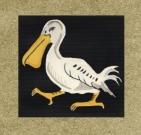
Divisional Sign / Service Insignia: 62nd (2/West Riding) Division
Data from Soldiers Died in the Great War 1914 - 1919 Records
Soldiers Died Data for Soldier Records
Surname: SANDERSON
Forename(s): Walter
Born: Sedbergh, Yorks
Residence:
Enlisted: Sedbergh
Number: 267237
Rank: L/Cpl
Regiment: Duke of Wellington's (West Riding Regiment)
Battalion: 2/7th Battalion
Decorations:
Died Date: 26/03/18
Died How: Died of wounds
Theatre of War: France & Flanders
Notes:
Data from Commonwealth War Graves Commission Records
CWGC Data for Soldier Records
Surname: SANDERSON
Forename(s): W
Country of Service: United Kingdom
Service Number: 267237
Rank: Lance Corporal
Regiment: Duke of Wellington's (West Riding Regiment)
Unit: 2nd/7th Bn.
Age:
Awards:
Died Date: 26/03/1918
Additional Information:
View Additional Text
View Additional Text For Soldier Records
LETTERS OF PRIVATE WALTER SANDERSON
(Courtesy of John and Caroline Sanderson of Endmoor, Cumbria and Rose Sanderson of Sedbergh, Cumbria)
INTRODUCTION
Walter Sanderson was born at Dowbiggin, Sedbergh, 19 June 1894. He was the youngest son of Thomas Richard and Rose Sanderson, née Haygarth who had a family of fifteen children – seven girls and eight boys. The family lived at Kilnbeck, Dowbiggin, where Walter’s father was a farmer and also a local Methodist preacher. His grandfather was sometime Master of Garsdale National School. Some family members who are mentioned in the letters are: Will or Willie, (brother); Mat, (brother); Thomas, (probably Thomas Richard, brother); Ellen and Mary, (sisters).
Some of Walter’s fellow soldiers who are mentioned in the letters and also in the 2/6th Bn. Duke of Wellington’s (West Riding Regiment) are as follows: Pte. F.A. Britton, ‘A’ Coy.; Pte. T.W. Woof, ‘B’ Coy.; Pte. G. Mounsey, ‘D’ Coy. and Pte. W.B. Mason, ‘D’ Coy. Also mentioned in the letters is Pte. T. Bracken, of the 2/5th Bn. who was killed at the Battle of Bullecourt, 3 May 1917.
THE LETTERS
[LETTER ONE – Written by Walter to his eldest sister, Elizabeth. The 2/6th Bn. Duke of Wellington’s (West Riding Regiment) were stationed on Salisbury Plain from January 1916 to June 1916 when they moved to Suffolk. The letter below is on a single sheet of paper which has been folded into four. The front face is ‘badly marked’ and several of the words are illegible, especially along the fold lines]
Lark Hill
Thursday
Dear Sister,
Just a few lines to let you know I have got the parcel and thank you all very much for it. I haven’t got the stamps you sent but they might come in a few days -------- for a few days. You must not send any butter or eggs. I do not need anything of that sort. We have the butter on the table and we butter brown bread. I have no means of cooking eggs, so it is of no use. I will send Mat’s purse back -------- [washing]. You -------- send me an old Christian Herald the next time you send a parcel. I have nothing to read. My arm is better again. I have sprained my foot with running but it is about better again. I have done nothing for two and a half days. Has father gone to L’pool yet? It is very fine weather here. It is quite hot during the day. There has been a few showers during the night but it is fine again today. I saw it in the paper about Willan Batty going to be married and about the presentation at the chapel. One of the Sedbergh boys had a Westmorland Gazette. I see old J. Robertson is dead. J. Dinsdale from Green [Sedbergh] is in the medical hut again. He has never been well since he came here. Well I think there is nothing else at present so I will close with love and thanks to all.
Walter
P.S. I have moved into another hut, 32 but it does not matter about the number of the hut. The men are a more respectable lot in this hut. There is W. Mason and Mounsey in this room.
[LETTER TWO – The 2/6th Bn. Duke of Wellington’s (West Riding Regiment) were stationed in Suffolk from June 1916 until October 1916 when they moved to Bedford]
STATIONED AT Henham Park Wangford Tuesday 1916
Dear Joe,
I got your letter this evening. I am sorry I have not written for so long. Time slips away so fast. You needn’t trouble yourself about me, I am in the best of health. I would like to be with you amongst the grouse and partridge etc. I often say to T W Woof that I would like to be at Cautley. I don’t think you need worry about me having to go to France. I think I am as near France as I ever shall be, but if we did happen to go I would write to you the first of anybody and let you know. I often have a talk with Tom Bracken, well in fact we are very often out together. He is a regular sport for game, just one of your sort. He likes to be touching everything that’s game. I daresay we shall get another leave before so very long but I can’t say for certain. I was chosen for a bomb thrower but I think I have managed to get out of that. It is a rotten job so I have gone in for a machine gunner. There is no bayonet charges for the machine gunner. We have to pass our test in about a fortnight – I think I shall pass alright. I am about the best in the team. I tried to get in the transport a few days ago but I didn’t manage to get in. I thought Thomas had been called up a few weeks ago, he is very lucky to have got off so long. You must let me know how Mat comes on as soon as ever you can. I had a letter from Sam Allen. He has got into the RFA. I daresay you will nearly have finished getting bedding by now. I had a letter from Will the other day. He has been very busy lately. Well there is no more news at present. I could tell you more if I was at home. I will close now hoping you are all well.
Your affectionate brother,
Walter
PS Write back soon.
[LETTER THREE – Probably written when in Suffolk during the summer of 1916. Only the last two pages of this letter have survived]
…parade was nearly three miles long. It was so hot that men were falling in the road side every few yards. Four hundred and seventeen men fell out before we got back to camp. Some of them got brought to camp in vans and some of them stopped in the road side all night and some came back the next day. About half the men in the camp were lame the next day. I had just about had plenty when I got back but I managed to stick it all right. Two or three horses fell down dead when they got back so you may know what it was like for us poor beggars with the pack on. Well I don’t know of anything else to tell you this time so I will close with best love to all.
Walter
PS Have you got a soldier boy for haytime?
Write as soon as you have time.
[LETTER FOUR – Only the final page of his next letter has survived]
…W Mason has been in hospital for about a month but he is alright again and is back with us now. You didn’t send me Thomas’ address. I suppose it was that memory of yours and if I don’t get a letter from you in a few days I will get a special leave to come and give you a lecture. It seems to be ages since I heard from you, but you will most likely be very busy now so I had better excuse you and not come to lecture you. Well I have no news so I might as well dry up. You must let me know how Rowland is getting on. He is never hardly out of my mind. Well I will close with very best of love to all,
Walter
[LETTER FIVE – The 2/6th Bn. Duke of Wellington’s (West Riding Regiment) moved to Bedford in October 1916 and went to France in January 1917]
Bedford
Friday
Dear Joe,
Just a line hoping you are all well. We are expecting going across the dub before long. When I got back from home, all the other lads had got ready for going. We have got steel hats and everything that we require. You had better not tell father we are expecting going. He will only bother himself and it might not come off. We have got ready before and then had to give the stuff back again. If we do happen to go I will let you know and then you can tell father and you must cheer him up as much as you can. Well there isn’t much news so I will close with love to you all.
Walter
[LETTER SIX – Written 10 May 1917]
Friday
May 10
Dear Joe,
At last I am trying to write a few lines but I don’t really know what to write about when I have started – there is no news. It is splendid weather here I suppose it will be the same at Sedbergh now. In your last letter you said you were expecting being called up. You must let me know how you have come on, you will most likely not have to go. We are out of the trenches at present, having a bit of a rest. T. Woof has got a good job now. He is a groom for one of the officers. He is never anywhere near the trenches. I haven’t seen him for about a month. I sometimes see Tom Bracken. Well I don’t know of anything else at present so I will close with very best love to all. Your affectionate brother.
Walter
[LETTER SEVEN – Written by Walter to his eldest sister, Elizabeth]
In the field Tuesday 2-10-17
Dear Sister,
Just a line or two hoping you are all quite well as I am at present. We have had a very good time lately as regards the weather. It has been very fine for over a month now. It will be a new sort of work for our people to plough. David Gillespy’s end was not a very pleasant one. He has done very badly the last few years, he has done nothing but drink since he lost his job at the gas works.
How is Willie getting on I hope he will soon be alright again, I hope he is lucky enough to get a leave this time.
Fred Britton is lucky to get back to Blighty so soon.
I wish I could do the same but it will be my turn in a bit perhaps.
Well I will close now,
your affectionate brother,
Walter
[LETTER EIGHT]
Tuesday
4. 12. 17
Dear Father,
A few lines hoping you are quite well. I am down at the base in hospital at present, but you must not be alarmed, there is nothing serious. I have got a bit knocked up with being in the trenches so long in the cold and wet. We were in the trenches four days and then came out for a day and a half and then we went back for other seven days. I think it is the worst time we have had since we came to France and I don’t think we are likely to have another time like it. I do feel truly thankful to God for sparing me through all this terrible conflict. I haven’t had any letters from you for over a fortnight but I expect there will be some for me at the battalion and they will be sent on in a few days.
[Page(s) of this letter must be missing here as it does not follow on]
… here but I don’t think I have ever written to answer it because we have been up the line so much I haven’t had time. It is wet and cold weather here. It will be miserable for the lads in the trenches, it would be a great blessing if we could have peace again, but I suppose we will have to wait and it will come some time. I was at a very nice little service last night, it is quite a treat to get to one, it is only about once a month we get the opportunity. Well I don’t know of any news at present so will close with best love.
Yours affect son,
Walter
[LETTER NINE]
Convalescent Depot
BEF
Sunday 16. 12. 17
Dear Father,
Just a line hoping you are well. I am at a convalescent camp at present but I don’t know how long I shall stop here. I have got alright from the trench fever but I have got a bad foot yet. I haven’t had a letter from home for about three weeks. I suppose they are getting lost. You will likely be very busy now with it being so near Christmas. I think I shall be at the base for Christmas. It will be a lot better there than up the line. The war will surely be over before another Christmas and all of us back in Blighty. I had a letter from Maggie and she says things are getting very bad in England.
It is snowing fairly heavy here tonight and it is very cold. You can send letters here and, if I have gone from here when they come, they will be sent on after me, but you must not send any parcels. I had a letter from Ellen. She has sent a parcel about a fortnight ago but it has not landed here yet and I don’t suppose it ever will.
Well I don’t know of any news so I will close with best love to all.
Your affect son
Walter
[LETTER TEN – Probably written about the 22 December 1917, as an envelope exists that is addressed to Walter’s father and stamped with the above date]
5 Convalescent Depot
2 Company, Sect 23
APO, BEF France
Dear Father,
Just a line hoping you are well. I hope you had a good happy Christmas. I suppose it would be very quiet this time with things being in such a bad way. I managed to get to two services and had a nice time. Most of the men in camp were worse for drink. At dinner time they were going round to the tables with bucketfuls of beer and the place was as bad as a pub. I never saw such a mess. The table was swimming with beer and I was about covered with it. About the only thing that they can give for Christmas seems to be liquors. It has been rather wild weather, it has been snowing and driving this morning. I don’t know how long I shall be at this place, but if I am lucky, I might be here for six or eight weeks and then I shall have to go to the base training camp after I leave here.
It is over a month since I have had a letter from either home or from Joe. I hope there is nothing the matter. You must write and let me know.
Well I don’t know of any news so I will close with love to all.
Your affect son,
Walter
[LETTER ELEVEN]
Saturday
5. 1. 18
2/6 D of W’s
5 Convalescent Depot
2 Company 23 Section
APOBEF France
Dear Joe,
I received your letter and am very pleased to hear from you. I get very downhearted sometimes when I don’t get any letters for a long time. There is no body here that I know and it is rather miserable when I have no pals. Your letter was dated Dec 18 on the stamp so you see it has been a long time in getting here, it has been three weeks. I have had a slight touch of trench fever, but I am quite better now, and I expect I shall be leaving here in about a week and going to the base camp for a short time.
I have seemed to have no luck at all lately. When I went to hospital I got on a train that should have gone straight to the boat to go to Blighty, but there was too rough a sea that night so we were all put in a hospital in France and missed getting across, and then when I came here I tried to get a job in the butchers shop, and I would have got it, but they couldn’t let a Lance Cpl have a private’s job. I could have sworn when they told me. It was a six weeks job at the very least. I could have stopped in hospital longer than I did, but I wouldn’t stop in bed.
I an expecting getting leave when I get back to the battalion, but I am in no hurry to get back. I would like a leave, but I don’t like the idea of coming out here again. I suppose Thomas has been on leave and is thinking of getting married. He might set Will off if he does. I don’t know when I shall see the chap I gave the revolver to, but I will try and get one of the two that I had, when I get back, or else go over to Fritz and take some more off him. The other two were against one of the guns that we captured, and the man belonging to the gun was in a dugout asking for mercy.
The Germans came running to us in dozens with their hands up. It was exciting, but pitiful to see the poor chaps, half frightened to death that we would kill them. I haven’t seen Tom Woof for many a month. He didn’t come back after his leave. You know he went over for a job in England. I wrote to him once but never got an answer, so if you can get to know where he is you might let me know. I heard that Mat was looking very bad. I hope there is nothing serious the matter with him. I have my fears that there is, so you must let me know the next time you write. I shall be uneasy till I do hear. Well I shall have to get to bed before it is lights out so I will close for the present.
[This letter was continued on the same sheet of paper, the next day]
Sunday 6. 1. 18
I have had a letter from Mary this morning and she says Thomas has been and gone and done it (poor lad). Well I don’t know of much news. There is a bit in your letter I don’t understand. You sat something about having a look for raynard – I can’t make it out.
Is Jack Handley (Spout) [Dowbiggin] still in England? You might let me have his address if you can get it. Do you know anything about Sam Allen? I have written to him several times and I never got an answer, and then I heard he had been killed. I hope that is not correct. I am going to a bible class this afternoon so I will have to dry up. Hoping to hear from you again soon.
Your affect brother,
Walter
[At the end of the letter is a drawing of a stick figure, wearing what looks like a helmet, with the letters R and H either side of the figure]
‘The Westmorland Gazette’ (30 January 1915)
(Kindly supplied by Sedbergh & District History Society)
MRS. THOMAS SANDERSON, DOWBIGGIN
Mrs. Sanderson, wife of Mr. Thomas Sanderson, of Kilnbeck, Dowbiggin, near Sedbergh died suddenly on Saturday morning. She had been unwell for a few days, but a fatal termination to her illness was not anticipated; she became very much worse on Saturday morning, and expired before the arrival of the doctor. She was 65 years of age, and leaves a husband and fifteen children–eight sons and seven daughters.
‘The Westmorland Gazette’ (4 May 1918)
(Kindly supplied by Sedbergh & District History Society)
SANDERSON, Pte. Walter. Mr. T. Sanderson, of Dowbiggin, has been informed that his son, Pte. Walter Sanderson, has been killed in France.
‘The Westmorland Gazette’ (20 December 1919)
(Kindly supplied by Sedbergh & District History Society)
UNVEILING OF MEMORIAL TABLET
A service was held in the Sedbergh Wesleyan Chapel on Sunday evening on the occasion of the unveiling of a tablet in the chapel to the memory of the men of the Sedbergh Wesleyan circuit who made the great sacrifice during the war. The tablet was unveiled by the superintendent minister, Rev. C.H. Stanley, in the presence of a crowded congregation, and he preached a sermon appropriate to the occasion. Suitable hymns were sung, and the choir sang the chorus, ‘No shadows yonder,’ from Gaul’s ‘Holy City.’ Mrs. Stanley sang ‘These are they which came out of great tribulation,’ a solo from the same work. The Dead March in ‘Saul’ was played by Mr. H.C. Trotter. The tablet is of white marble, and bears the following inscription:–‘Roll of heroes in the great war, 1914-1919. Sedbergh Wesleyan circuit. To the glory of God and in grateful memory of William E. Armer, 7th Border Regt.; Fred Bushby, Royal Engineers; Stephen E. Handley, 2nd South Staffs.; Thomas E. Haresnape, Royal Engineers; William Mason, 13th Batt. King’s Own Yorkshires; George Middleton, 4th Australian Pioneers; John Nelson, Royal Scots; Walter Sanderson, Duke of Wellington’s; Robert E. Seddon, 11th Border Regt.; John Winn, 16th Lancashire Fusiliers. Who have given their lives for their country. Greater love hath no man than this, that a man lay down his life for his friends.
THE HISTORY OF THE 62nd (WEST RIDING) DIVISION 1914-1919 Volume 1, by Everard Wyrall (John Lane the Bodley Head Limited Vigo Street, London, W.)
THE DEFENCE OF BUCQUOY
In many ways the 26th March, 1918, was a momentous and critical day. On this date the enemy further south, in the vicinity of Nesle, made energetic efforts to drive a wedge, and sever connection, between the British and French Armies. . .
On this day also the 62nd Division may be said to have entered properly into action, the Division defending Bucquoy with splendid gallantry. . .
The withdrawal of the 186th Infantry Brigade (Brig.-General J.G. Burnett), owing to the late receipt of orders, had to be carried out partly in daylight; the 2/7th Duke of Wellington’s (Lieut.-Col. F.S. Thackeray) moved back without interference and took up a position about 500 or 600 yards in front, but on the right flank of the 185th Infantry Brigade (Brig.- General Viscount Hampden). But the retirement of the 5th Duke of Wellington’s Regt. (Lieut. Col. J. Walker) was observed by the enemy, who followed closely in large numbers. B Company, the right flank of the Battalion (during the retirement) encountered an enemy cyclist patrol of forty men with light machine-guns in the Miraumont-Puisieux Road. The Company’s Lewis guns opened fire and dispersed the patrol, but one gun and a few men were cut off and captured by the enemy moving up the Miraumont Valley. Eventually the Battalion formed a defensive line about 300 yards east of the Bucquoy-Puisieux Road, with Lewis gun posts pushed forward. Three Companies were in the front line (A, B and C from right to left) and D Company was in support along the road.
The 2/4th Duke of Wellington’s (Major L.J. Coombe), having acted as outposts of the 2/7th and 5th Battalions, withdrew through the latter and took up a position in support just west of the Bucquoy-Puisieux Road. The 9th Durham Light Infantry (Pioneers) were about 300 yards west of the Puisieux-Bucquoy Road, in some old trenches. . .
The moves of the three Infantry Brigades were completed by about 8 a.m.
But the position of the 2/7th and 5th Duke of Wellington’s Regt. was by no means a sinecure; neither knew of the whereabouts of the other. The first named Battalion held a position right out in front of the left flank of the 5th Battalion and the right flank of the 8th West Yorks. (185th Infantry Brigade); the danger of penetration or envelopment was therefore great. . .
The right flank of the Division was always the point of anxiety. Here the 5th Duke of Wellington’s, who had almost to fight there way back to the positions they now held, had, at about 8-30 a.m. received the welcome addition of a section of four machine-guns from the M.G. Battalion. Two were placed immediately north of Puisieux to cover the Miraumont-Puisieux valley and two to cover the approaches from the direction of Achiet-le-Petit. The enemy at this period was well within range and all four machine-guns came immediately into action. Very soon afterwards the enemy was reported in Puisieux and on the high ground south of that place. ‘A’ Company of the 5th Duke of Wellington’s was, therefore, withdrawn and placed facing directly south towards Puisieux to protect the right flank. All the while the enemy was pressing vigorously, but was held back by rifle, Lewis-gun and machine-gunfire. The 9th Durham Light Infantry (under Major Wilson), in the support trenches about 300 yards west of the Puisieux-Bucquoy Road, established liaison with the 5th Duke of Wellington’s and the 2/4th Battalion was in support of both Battalions. Old trenches north of Puisieux afforded the troops some protection, but the right flank of the Division, though sorely pressed, was stubbornly defended. The enemy’s troops seemed countless, they came on unceasingly – Company after Company. Puisieux was full of them, while south of that place they could be seen advancing in great numbers westwards to Serre, and it was not long before rumours were in circulation that he had reached Hebuterne. The 5th Duke of Wellington’s held on as long as possible, frustrating a very determined effort about 11-30 a.m. to outflank the Battalion. But a move was imperative, and gradually, fighting all the way, Companies giving mutual support, the Battalion swung back its right and, in conjunction with D Company and the 9th Durham Light Infantry, took up a position just north of the Gommecourt-Puisieux Road from the south-east corner of Rossignol Wood, joining up with the left of the 2/4th Battalion. All the while the left of the 5th Battalion had been out of touch with the 2/7th, whose whereabouts were unknown. The position occupied at about 2-30 p.m. on the 26th by Colonel Walker’s Battalion was maintained throughout the day.
Meanwhile the 2/7th Duke of Wellington’s had taken heavy toll of the enemy as he passed south of the Battalion, on towards Puisieux. The Lewis gunners caught numbers of Germans in enfilade and did great execution. Colonel Thackeray, being unaware that the 5th Battalion lay some way behind his right flank, deeming his right in danger of being turned, had used B Company to form a defensive flank. At about 10-45 a.m. the enemy seemed to be right round the right flank of his Battalion and he therefore gave the order to retire, Company by Company, to his second position which had been selected along the southern and south-eastern exits of Bucquoy. The withdrawal was carried out with few casualties, but on the C.O. informing Brigade Headquarters of his movements, he received orders to move back to his old position. This was a difficult task, as the enemy had already occupied part of his old position. Nevertheless, owing mainly to the dash and gallantry of A Company, who rushed an enemy machine-gun section, killed the team and captured two machine-guns, in the main the previous position occupied by the Battalion was reoccupied, though the right flank was extended along an old system of trenches, south of Bucquoy. Touch had been obtained with the 8th West Yorks. on the left and when the movement had been carried out the 2/4th Duke of Wellington’s were in the gap between the right of the 2/7th and left of the 5th Battalion. . .
The continuous heavy attacks of that day of fierce fighting will long be remembered by the Division; attacks, pressed with great vigour by troops from whom the final fruits of victory had already been snatched. For by the afternoon of the 26th March the great German offensive, north of the Somme, had almost spent its fury. . .
It was, therefore, with a fury bordering on despair, that the enemy flung himself into the gap between the flanks of the IVth (62nd Division) and Vth (12th Division) Corps, in a last vain endeavour to drive a wedge between the right Corps of the Third Army. He almost succeeded, but not quite, and the reason he did not do so was largely owing to the fine defence put up by the 62nd Division about mid-day and during the afternoon of the 26th March, when attack after attack was launched against it, but fell back broken and shattered, like waves dashing themselves uselessly against a rocky coast. . .
During the afternoon no less than five attacks were made on the 2/7th Duke of Wellington’s Regt. and the 8th and 2/5th West Yorks. They were all bloodily repulsed. The first three reached a line about 400 yards in front of the wire entanglements which protected the frontage of the West Yorkshiremen. Here the enemy’s troops not only came under very heavy frontal fire from machine-guns, Lewis guns and rifles, but, on each occasion were caught in enfilade by the Lewis gunners of the 2/7th Duke of Wellington’s, firing from the forward trenches of the latter Battalion. These three attacks were obliterated. The last two did indeed succeed in reaching the wire, but here the same fate met the enemy as on his three previous attempts and only a few survivors crawled back to the German lines.
It is impossible not to admire the bravery of the enemy’s troops, but they had opposed to them tough and hardy men who had served their apprenticeship with Failure, Disappointment and Suffering and who, but a year previously, had passed eastwards only a little south of the line they then held, somewhat green as soldiers, somewhat young in knowledge of warfare, yet just as high in spirit as on this day of March, 1918, when tried in the fire of battle, they were found true metal. “It was amazing to see,” said a C.O. of his Battalion, “how cheerful all ranks were in this time of strain, partly because they knew what depended on their ‘sticking’ it and partly because they could see the damage they inflicted, but mainly because of the sporting spirit that was in them; the more difficult and desperate the circumstances the more cheery and self-reliant they became.”
And this being true of one Battalion was true of all, for that was the spirit of the men, of that Yorkshire which bred them. . .
[Walter Sanderson died of wounds received during the defence of Bucquoy on the 26th March.]
England & Wales, National Probate Calendar (Index of Wills and Administrations), 1858-1966
1918
SANDERSON Walter of Killbeck [sic] Sedbergh Yorkshire died 26 March 1918 in France Administration London 4 July to Thomas Richard Sanderson farmer Effects £179 12s. 6d.
1929
SANDERSON Thomas Richard of Kilnbeck Farm Dowbiggin Sedbergh Yorkshire died 16 November 1929 Probate London 20 December to William Sanderson farmer and Joseph Sanderson postmaster. Effects £1430 3s. 6d.
View Additional Image(s)
Additional Photo(s) For Soldier Records
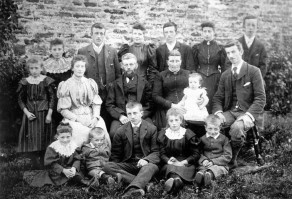
The family of Thomas Richard and Rosie Sanderson with their fifteen children outside Kilnbeck, Dowbiggin, taken in 1893.
Back row, left to right: Mary, Thomas, Nanny, John, Roseanne, Matthew; Middle row, left to right: Isabel, Elizabeth, Thomas Richard, Rosie (née Haygarth), baby Walter, James; Front row, left to right: Margaret, Joseph, William, Ellen and Robert.
Courtesy of John and Caroline Sanderson, Endmoor, Cumbria and Rose Sanderson, Sedbergh, Cumbria
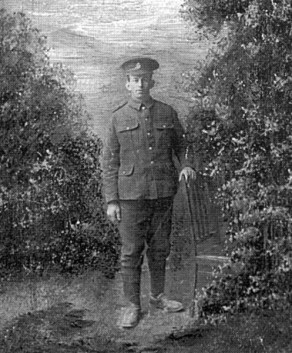
L/Corporal Walter Sanderson
Courtesy of John and Caroline Sanderson, Endmoor, Cumbria and Rose Sanderson, Sedbergh, Cumbria
---
---
Comment on this Soldier Record
You can leave comments on this soldier record. Please note all comments will be manually approved before they appear on the website.

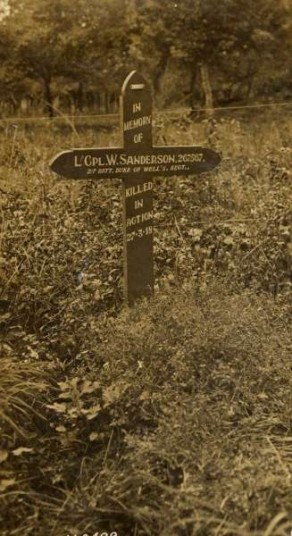
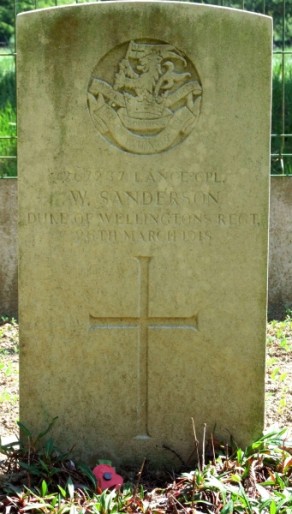



No comments yet.